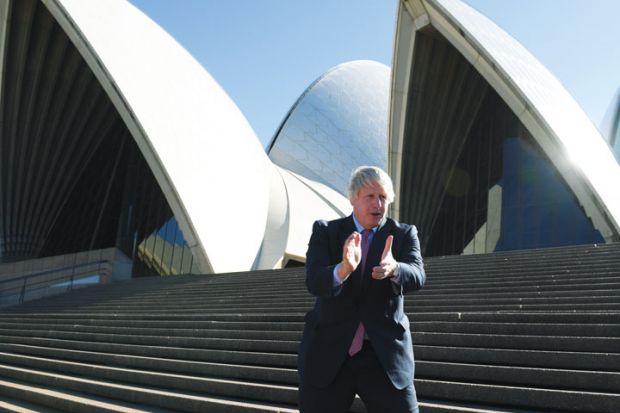Boris Johnson’s proposal to reintroduce post-study work visas in the UK could have the unexpected consequence of forcing Australian universities to shorten their master’s degrees.
A key selling point of UK universities is the opportunity to complete a master’s degree in a year, rather than two years, as is standard in many other parts of the world.
In recent years, Britain’s success in recruiting international students has been held back by the absence of an attractive post-study work offer. But the prime minister’s plan to offer foreign students two years of post-study work rights will change this and international education advocate Phil Honeywood said that this might force Australia to look hard at whether it could continue to run two-year master’s degrees.
“Changes of duration may be required,” Mr Honeywood told the Tertiary Education Quality and Standards Agency conference in Melbourne. “I’m just putting it out there. I’m talking from a global competitive perspective.”
The observation reflects the sometimes seesawing nature of higher education policy. Shorter master’s courses had been commonplace in Australia until a 2011 review recommended that post-study work visas should only be made available to graduates of two-year master’s.
“Immediately, all of our public universities switched to two years,” Mr Honeywood, chief executive of the International Education Association of Australia, told Times Higher Education.
“The argument now would be [that] if we’re to be competitive, we need to go back to potentially having a one-year master’s. How that works out in terms of squeezing enough units of study to make it academically appropriate is going to be a battle we have to have.
“But if the UK can have one-year master’s then I don’t see why Australia cannot. Pedagogically, if we used to have one-year master’s, I don’t see why we can’t go back to them.”
Some fast-track master’s still exist in Australia, and the regulator TEQSA scrutinises outcomes rather than study duration. However, time-consuming regulatory approval would be required for major changes to existing master’s courses, such as reduced duration.
And under current Australian legislation, post-study work visas are only available to people who have been in the country for at least 16 months and studied for at least two academic years.
Mr Honeywood said he had not yet discussed potential changes with the IEAA board. “It’s just so new,” he said. “I’m really putting it out there that we need to explore the option. And we need to do that quickly because of the lag time it would take to get a one-year master’s approved.”
The debate reflects the constant change in international education settings, as countries seek to boost their allure in a competitive environment. Under changes announced in October, foreign university graduates who have studied anywhere in Australia outside the three biggest cities of Sydney, Melbourne and Brisbane are entitled to three years’ work rights.
And under arrangements introduced in August last year, international graduates of courses at bachelor’s level or higher are entitled to three years’ work rights in New Zealand.




